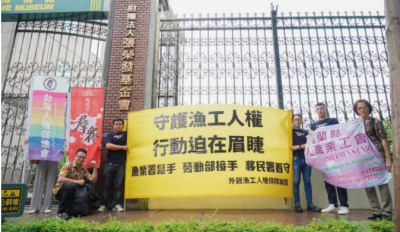
Publication Date:
There is a strong civil society movement fighting for migrant fishers’ rights in Taiwan and it is in need of greater international attention and solidarity.
Taiwan ranks among the top 25 seafood producers worldwide, with an annual US$3 billion industry.1 It also has one of the largest distant water fleets in the world, sporting more than 1,100 Taiwanese-flagged or -owned vessels that fish in all five oceans. The majority of workers on Taiwanese fishing vessels are male migrant workers from Indonesia, the Philippines, and Vietnam, including 12,476 employed in Taiwan’s coastal and offshore fisheries and 22,302 in the distant water fleet in 2019.
Investigations have consistently revealed egregious human rights abuses in Taiwan’s fishing industry, with problems ranging from dangerous working or living conditions and wage deductions to confirmed cases of forced labor, human trafficking, murder and disappearances of migrant fishers at sea. Human rights monitors emphasize that the wrongdoings on Taiwanese vessels are not sporadic but are systemic and routine. Research has also revealed strong linkages between forced labor and illegal, unreported and unregulated (IUU) fishing. In recent years, the Taiwanese government has instituted legal and regulatory changes. However, NGOs find these changes to be insufficient and they continue reporting serious abuses.
The majority of severe cases of abuse involve workers in distant water fishing fleets. This is due to a discriminatory legal framework that offers them fewer rights and protections compared to those employed in most other labor sectors. Migrant fishers face extremely long periods of work at sea, ranging from six months to three years. Taiwan’s distant water fleet, moreover, has a significant number of Flag of Convenience (FoC) vessels, which are purposefully flagged to countries with lesser regulations to lower costs and avoid scrutiny. Finally, migrant fishers lack access to unions, service providers and actors who are able to monitor conditions on the high seas.
Perhaps the biggest player in Taiwan’s fishing industry is Fong Chun Formosa (FCF), which is one of the world’s top three tuna traders and acquired major U.S. tuna brand Bumble Bee in early 2020. FCF operates 600 distant water vessels and with an annual revenue of US $1.5 billion, and connects Taiwanese fish produce to international markets. FCF has been linked to forced labor by Greenpeace.
Local non-governmental organizations and unions, including those in the ‘Human Rights for Migrant Fishers Coalition’, have been leading a bold advocacy agenda to improve migrant fishers’ rights. They are advocating for legal, policy and regulatory reform; calling for greater corporate responsibility; and raising awareness among the general public in Taiwan — all with the aim to ensure migrant fishers have decent working conditions and legal protection.
This report identifies entry points for the Seafood Working Group to support local movements in Taiwan that are pushing for reform and to end forced labor in the fishing industry. It includes a profile of the industry and the workforce, a mapping of local labor movements and their demands, and practical guidelines to help international advocacy organizations engage.
In February 2021, the Taiwan Fisheries Agency submitted an official response to the report in writing, which can be downloaded below.


